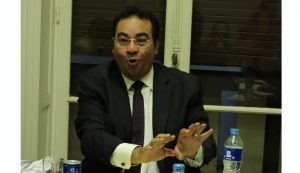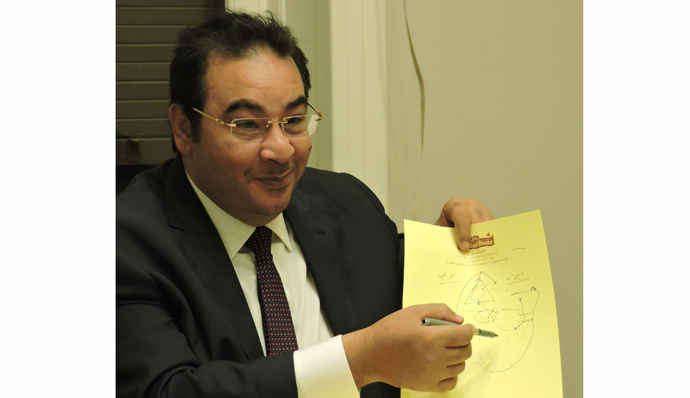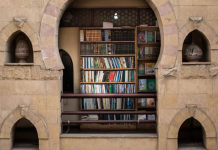The Middle East Observer began to organise a series of seminars and press meetings with MPs, economists, manufacturers and investors to discuss economic solutions addressed within the current economic reforms set by the Government, fighting widespread corruption, obstacles to decision-making, fiscal consolidation, rationing energy subsidies, civil-service and institutional reforms, new legislations, new public offerings, and other related economic issues.
All sectors must be developed for the benefit of the citizen
The MEO began in its various issues a series of seminars with MPs who are responsible for the Egyptian economy, investors and the government.
This move comes within its campaign for coordination among legislative and executive authorities, and owners of companies. The campaign aims at identifying real economic problems, in an attempt to solve those problems and provide officials and MPs with rapid solutions to be implemented in the upcoming period with support from MPs and the government.
The MEO was the first to organise these important seminars and press meetings, which benefit the investor. MP and the government are dedicated to resolve outstanding problems according to an executive and legislative vision that will help these economic entities to overcome obstacles to development.
Cash subsidy is the best option & the investment law needs a community dialogue
When the investor expand vertically, his project will create new job opportunities
Explains the idea of withdrawing cash from the market
I believe that raising bank interest rates is a serious problem yet I hope that I am wrong
The MEO has recently invited Mr. Ehab Al-Kholy, Member of the Egyptian Parliament and Secretary-General of the Legislative Committee, to an open panel discussion on the latest developments related to Egypt’s economic situation. The panel has been open with many questions and discussions. Al-Kholy responded to these questions and talked about a number of the most important economic issues which concern the Egyptian citizen First of all, Has the government sent the Investment law to the Egyptian Parliament for approval and how do you regard the new law ?
I believe that the law has not been sent to the parliament yet. I believe that only a community dialogue on the law was conducted among those who are concerned with investment.
I have talked to Dr. Ali Meselhy about the law and I told him my point of view that the law cannot be enacted directly by the government because it will only reflect the government’s vision that only targets investment management. Moreover, the law does not consider building investment infrastructure, which should be the most important element in it.
So, what do you propose when it comes to the investment law ?
In fact, I submitted an initiative in this regard three months ago. The initiative targets various sectors, for example, the industry sector, which is one of the most important sectors in the investment field. The industry sector faces many problems and challenges, such as bureaucracy which argues the concept of the One window system as a solution to overlap disputes between the government authorities and ministries in land allocation and obtaining licenses, and construction permits. I have urged the MP Mohammed Al-Swedi as Chairman of the Parliament’s Committee on Industry and Head of the Federation of Egyptian Industries to hold meetings with different professionals, within their relevant fields of competence, to identify the real problems facing them. Many factories have halted there production due to social insurance dues. What measures will the state take in this regard? Instead, it would be better if the factories began to operate and resolve there financial dues and problems later on, in order to revive the Egyptian working force towards increasing production, which will in turn ease the burden put over the US dollar.
To sum up, the state makes decisions yet the citizens are only concerned with their interests, which they may fulfill in illegitimate ways, putting pressure over the economy itself. This is a part of Egypt’s real crisis. Therefore, we will not be able to enact a good law of investment unless we discuss all our economic problems with the utmost transparency, in order to encourage investments.
How does investment impact imports and exports verses the current US Dollar fluctuating exchange rates & Central Bank Reserves ?
Opening doors for investments, will lead to an Egyptian product and will lead to developing exports as well. I am convinced that when we produce an Egyptian product and create investment opportunities, this will in turn reduce importing, which is typically normal.
Second, the US dollar price in Egypt is set according to supply and demand, however; this is not a real problem, as it will take some time with the current economic reform to reach a balanced exchange rate between the US dollar and the Egyptian pound, which will lead to a relatively stable market. Another point I would like to tackle is the cash reserve. I believe the Central Bank’s cash reserve should best stand at $20 billion, while running transactions within $2-3 billion is appropriate as a moving market margin. We must also consider a very important point, which is reducing imports and not banning it in order to expand in investment opportunities and industries.
What do you think about raising bank interest rates, and what is the incentive for investors?
I believe that raising bank interest rates is a serious problem yet I hope that I am wrong. Based on a simple calculation, not all projects generate 20% profit, which is the current interest rate granted by the bank. Moreover, tax authorities must be aware of the fact that if we reduce taxes, we would be able to create more investment opportunities and generate more revenues. However, the state insists on imposing progressive tax because countries that have adopted free market economy impose very high taxes and I actually agree with them. However, instead of increasing taxes imposed on investors who generate profits amounting to more than EGP 5 million, ranging from 20% to 30%, we can give the investor incentive packages. We can give him a 20% incentive package if he/she expanded his/her business vertically, horizontally, qualitatively and quantitatively.
Why will we impose low tax?
When the investor expands vertically, his project will create new job opportunities that will cover social insurance charges, thus, creating new job opportunities. Moreover, the state will be a partner in the investment project contributing with 20% margin profit. If there is a project and its profits are 20%, the state will collect taxes. If we built, for example a factory and allow the investor to be a stakeholder, the state will be a partner with 20% shares in addition to taxes that the state will collect, effortlessly. Therefore, investment incentives must be included in the law of investment, including tax incentives.
Which is better cash subsidies or in-kind subsidies? What are the rules that will govern distribution of subsidies?
In my opinion, cash subsidies are better. Any economic reform in a developing country can not depend on one or two measures, however; integrated packages of measures must be taken into consideration to overcome economic problems and according to a well-considered timetable and through a series of deliberate steps.
Egypt has taken three measures in one week and they are as follows:
The Seventeen resolutions of the Supreme Council for investment.
Exchange rate liberalization, which led to floatation of the Egyptian pound.
Lifting subsidies on fuel prices
These are important and historical measures, and were inevitable according to International Monetary Fund’s. The remaining measures should be taken as soon as possible in order to achieve financial balance and address implications of these decisions:
First, we must replace subsidies on goods and services with cash subsidies as soon as possible, which should balance the current imbalance between wages and prices.
Second, we must increase commodity subsidies given to impoverished families living under the poverty line from L.E.18.00 per capita to the highest percentage that the government can afford.
Third, we must verify the smart ration cards that are currently being issued by the Ministry of Military Production. We must also dispose of ten million cards that are allegedly duplicated or forged.
Fourth, we must make the public aware that cash subsidies are the best solution for the classes that are struggling to survive on minimum wage.
Fifth, we must expand the Solidarity and Dignity Program launched by the Ministry of Social Solidarity.
How can we take all these measures?
The society’s rapid acceptance of taken measures is the fundamental element in the process and the difference between people›s ability to understand, and bear the consequences of these decisions is important.
Given energy saving and fair distribution of subsidies, I ride a Mercedes, the Saudi ambassador rides a Chrysler, the Swedish Ambassador rides a Ford, the public employee rides a Fiat 128 and the ordinary citizen rides microbus. How can we achieve social justice among them?
We want to tackle the problem at its root through lifting subsidies and giving cash subsidies to those who need it the most. Thus, we can save a greater amount of money from lifting subsidies on fuel prices.
What would happen to farmers who use diesel for their work in farming ?
Subsidies are not only dedicated to gasoline prices, as some might think, but also to diesel prices. Instead of subsidies on diesel prices, the government can give the farmer annual cash subsidies according to agricultural holding. Thus, I believe that the subsidies will be given to those who are eligible to receive it. Meantime, gasoline litre price in Sudan is now worth L. E.11, which is higher than its price in Egypt, as the Sudanese government has lifted subsidies on gasoline. In electricity, citizens are now using charge cards. In my opinion, we must lift in-kind subsidies in order to eliminate the economic problem from its roots and give cash subsidies so that the eligible citizen can benefit from it. This is the social justice at its finest. The social justice does not necessarily mean that the poor and the rich are equal when it comes to subsidies, even in food commodities.
What are the needed procedures that should be taken in order to solve the bread problem?
I believe that the bread is the real problem. However, if the state has already launched its economic reform, as we are a major wheat consumer. If we stated with far less effort that we need wheat, the stock will be up because we are the world’s biggest wheat importer. However, bread subsidy system is quite successful.
After raising prices and lifting subsidies, will we suffer from inflation?
Inflation rate is based on evaluating strategic commodities price hikes, such as gasoline, sugar and flour, and calculate its annual and monthly average. Given the current soaring prices verses the US dollar price, the crisis will continue because we have lifted subsidies on gasoline during this month while the US dollar price is increasing. Thus, if we now allocated 30% subsidies, it would be like we have not lifted subsidies in the first place.
In your opinion, is the political economic system stable?
11/11/2016 extended a message to the world that Egypt is politically stable and its political regime has its people’s support because they did not protest despite floatation of the Egyptian pound and lifting subsidies.
What are the fast decisions that need to be taken in order to reform the economic system?
I believe that there are three important decisions that must be taken. However, we must give priority to infrastructure, which is fundamental to the economic reform process.
On the other hand, Cash transactions needs to be transferred to credit & debit cards. We must increase number of Automated Teller Machines.
Within the global economic reforms and cash crisis, banking and cash flow systems needed to be developed, rapid and critical changes were made. As a result, E-payment cards are now used in trade and service as an important payment tool in banking business. The use of E-payment cards has increased due to its increased advantages (rapid exchanges- avoiding cash carrying risks – effective payment…), particularly with the use on Internet. These cards are also increasingly used inside a country or among different countries. Moreover, it has now become a substitute for money in dealings and money exchanges. The Egyptian government must implement this tool to be the main tool for dealings within the Egyptian market in order to track cash dealing in the market, particularly parallel dealings (street vendors). Cash dealings of each individual must not exceed L.E. 20 thousand every three months. Afterwards, the state will change and withdraw currency from the market in order to know liquidity in formal and informal sector in the bank and accordingly be able to monitor and develop the informal economy which will then allow for a fair and tax collection and will set grounds for social justice.












